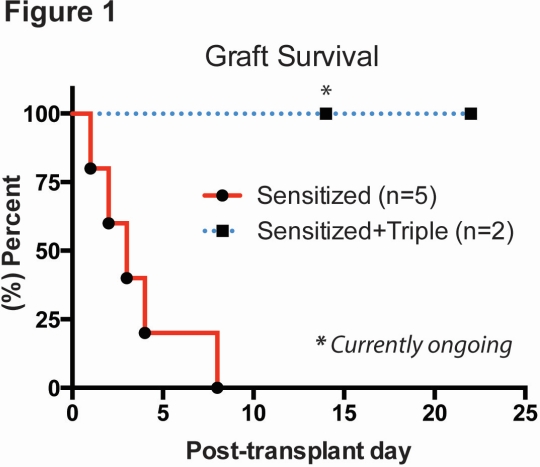Costimulation Blockade and Bortezomib to Desensitize Rhesus Macaque and Prolong Renal Allograft Survival
Surgery, Emory Transplant Center, Atlanta, GA.
Meeting: 2015 American Transplant Congress
Abstract number: 493
Keywords: Antibodies, Co-stimulation, Preclinical trails, Sensitization
Session Information
Session Name: Concurrent Session: New Immunosuppression Strategies: Primate Models
Session Type: Concurrent Session
Date: Tuesday, May 5, 2015
Session Time: 4:00pm-5:30pm
 Presentation Time: 4:48pm-5:00pm
Presentation Time: 4:48pm-5:00pm
Location: Room 119-A
[Background] Preformed donor specific antibody (DSA) due to prior sensitization affects a significant population of transplant patients, portending a poorer prognosis in short- and long-term graft survival. We investigated the effect of proteasome inhibitor (Bortezomib) and costimulation blockades (COB; Belatacept and 2C10, the latter an anti-CD40L mAb) on DSA and plasma cells in pre-sensitized rhesus macaques in order to develop a sustainable desensitization regimen.
[Method] All rhesus macaques were sensitized by a full MHC class I mismatched skin graft (∼ 2cm diameter). Grafts all rejected within 2 weeks without treatment. Animals received Bortezomib (N=3, 1.33mg/m2) or Bortezomib with COBs (N=3, 20mg/kg) twice a week for four weeks when their DSA level reached plateau.
[Results] Bortezomib treatment reduced bone marrow plasma cells (IgD–CD20–CD38+CD19+) but follicular helper T cells (Tfh; CD4+ICOS+PD-1high) were significantly increased. In accordance with this, DSA was not significantly reduced by Bortezomib treatment alone. In order to suppress Tfh cell induction, COBs, Belatacept and 2C10, were added to Bortezomib. The combination of COB and bortezomib significantly reduced BM plasma cells (9.60±1.22 vs. 25.66±12.27%; p<0.05), serum DSA levels, and LN Tfh cells compared to Bortezomib alone or COB alone. To confirm the desensitization effect, kidney transplantation was performed. Renal allografts without desensitization showed accelerated rejection (N=5, MST=3.6±2.7d). In contrast, desensitization with Bortezomib/Belatacept/2C10 treatment dramatically prolonged graft survival (N=2, MST>18±5.6d; p<0.05) with no signs of rejection. [Conclusion] Desensitization with Bortezomib alone moderately reduces both plasma cells and DSA but induces germinal center responses reflected by Tfh cell populations. However, targeting costimulation signals via Belatacept and 2C10 in conjunction with Bortezomib profoundly reduced Tfh cell populations, plasma cell number, and serum DSA. Desensitization with Bortezomib/Belatacept/2C10 significantly prolonged renal allograft survival compared to control groups without desensitization.
[Conclusion] Desensitization with Bortezomib alone moderately reduces both plasma cells and DSA but induces germinal center responses reflected by Tfh cell populations. However, targeting costimulation signals via Belatacept and 2C10 in conjunction with Bortezomib profoundly reduced Tfh cell populations, plasma cell number, and serum DSA. Desensitization with Bortezomib/Belatacept/2C10 significantly prolonged renal allograft survival compared to control groups without desensitization.
To cite this abstract in AMA style:
Kwun J, Burghuber C, Page E, Gibby A, Iwakoshi N, Knechtle S. Costimulation Blockade and Bortezomib to Desensitize Rhesus Macaque and Prolong Renal Allograft Survival [abstract]. Am J Transplant. 2015; 15 (suppl 3). https://atcmeetingabstracts.com/abstract/costimulation-blockade-and-bortezomib-to-desensitize-rhesus-macaque-and-prolong-renal-allograft-survival/. Accessed July 15, 2025.« Back to 2015 American Transplant Congress
